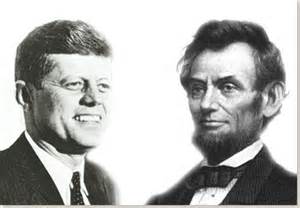Lincoln and JFK
 PBS documentary Lincoln@Gettysburg paints a vivid picture of Lincoln and those close to him in the days surrounding his oration at Gettysburg. Lincoln’s wife Mary Todd begged him not to leave for Gettysburg because their young son Tad was seriously ill. He went anyway. Lincoln’s valet, William Johnson, an African-American free man, accompanied Lincoln to Gettysburg and listened to Lincoln practice his speech that morning. Lincoln left Gettysburg with a fever and came down with smallpox. Johnson died weeks later from smallpox after caring for Lincoln. Lincoln chose the inscription “Citizen” on Johnson’s tombstone, and Johnson was buried at Arlington cemetery.
PBS documentary Lincoln@Gettysburg paints a vivid picture of Lincoln and those close to him in the days surrounding his oration at Gettysburg. Lincoln’s wife Mary Todd begged him not to leave for Gettysburg because their young son Tad was seriously ill. He went anyway. Lincoln’s valet, William Johnson, an African-American free man, accompanied Lincoln to Gettysburg and listened to Lincoln practice his speech that morning. Lincoln left Gettysburg with a fever and came down with smallpox. Johnson died weeks later from smallpox after caring for Lincoln. Lincoln chose the inscription “Citizen” on Johnson’s tombstone, and Johnson was buried at Arlington cemetery.
And, Lincoln knew that his speech, just ten sentences long, would be transmitted by telegraph and printed in newspapers across the nation. Lincoln, in those ten sentences, was reaching out to the people at the Gettysburg ceremony, but he was also reaching out to the nation. It was unusual for presidents to give this type of speech in those days, but Lincoln accepted the invitation to speak at Gettysburg. Lincoln, it could be said, was a (social) media genius.

